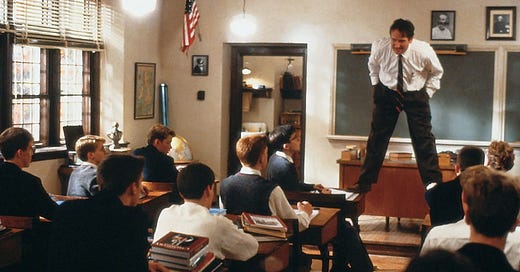I just guest-posted over on Professor Scott Galloway’s newsletter, No Mercy/No Malice. Scott’s been banging the drum for the cause of young men for years now, and my conversation with him on his podcast was one of the deepest, and most visceral, that I’ve had so far. So it was a delight to appear on his pages.
Head over to my post, “Head of the Class”, to get the whole argument, charts and details. My top lines are:
The share of male teachers has fallen from 33% in 1980 to 23% today, and continues to decline. That’s a loss of about 400,000 male teachers.
This matters because male teachers boost boys’ classroom performance (especially in subjects like English); because male teachers do a lot more afterschool work, including coaching; and because male teachers are more likely to be mentors to high school students.
It’s astonishing that the continued slide in the male share of teachers gets so little attention, and even less policy response, especially by comparison to the salutary efforts to get more women into male-dominated professions, especially STEM.
A clear goal of 1 in 3 teachers at the K-12 level being men, with particular attention to English, middle school and male teachers of color. (In some forthcoming work with Ember Smith, I’ll show that there are 50 Hispanic boys in ours school for every male Hispanic teacher, compared to 13 Hispanic girls for every female Hispanic teacher, and that there are similar gender gaps, at lower levels, for all ethnic and racial groups).
How to get more men into education? Higher pay overall; a boost to pay for extracurricular work; scholarships for men entering teaching; and a concerted effort to support and promote the contribution of male teachers specifically.
I conclude:
Unless we act quickly, there will be fewer and fewer men in our classrooms every passing year. If policymakers don’t think that’s a problem, they should explain why not. If they think it is a problem, they should do something about it.
As I said, do check out the full post, and subscribe to the newsletter while you’re there, it’s one of the very best around.
Thanks again to Scott and his team for having me on their pages. And not least to their illustrator who produced this fabulous original work at the top of the post:






I have a 15yo son who would make a terrific teacher. He loves kids and is so patient with them. When I think about the perfect job for him, it's middle school science teacher + basketball coach. But between the dismal pay and lack of autonomy, it just doesn't seem responsible for us to encourage him to pursue that path.
Couldn’t agree more that we need more male teachers but it’s essentially an unfunded mandate and the commenters here are in the minority. Broadly speaking the US doesn’t value education enough to pay for it. Unlike health care where we pay the most for the least compared to other developed countries in education we pay the least for the least. I am fortunate to have male friends who teach K-12 and they all went abroad to consulate school jobs first where they could bank funds to afford to survive on teaching salaries in the US. I’m optimistic we are at an inflection point in the downward spiral that has been public education. It used to be if a town wanted a teacher they built a house for them to live in. How about 0% federally backed mortgages for teachers and 0% student loans - as well as significant salary bumps?